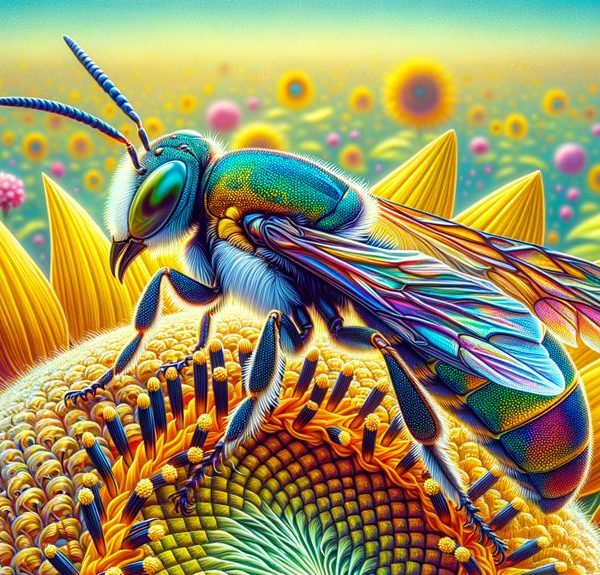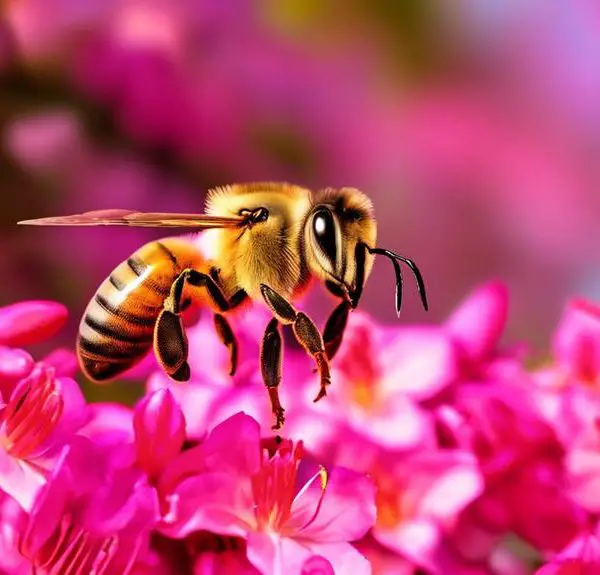Sting or savior? Unveil the mysteries and misconceptions surrounding the potential threat of the Asian honey bee.

Are Asian Honey Bees Dangerous
Just as you were enjoying the hum of a nearby Asian honey bee, you might have found yourself pondering over the potential danger they pose. It's a common enough question, especially considering the often alarming headlines about these insects.
You're not alone in wondering whether these tiny creatures are more than just a nuisance. While it's true that they can sting, the reality of their threat might surprise you.
But let's not get ahead of ourselves, there's more to discover about these fascinating creatures.
Key Takeaways
- Asian honey bees have developed evolutionary adaptations for disease resistance, making them hardier compared to European honeybees.
- The behavior of Asian honey bees varies based on their habitat, with forested areas promoting colony fission and urban areas leading to more aggressive behavior due to human interaction.
- When stung by Asian honey bees, immediate effects can include pain, redness, and swelling at the sting site, with the venom containing pheromones that can attract more bees.
- Mitigating the threats posed by Asian honey bees involves education, safety measures such as wearing protective clothing and using smoke for calming bees, seeking professional assistance for hive removal, and promoting the conservation of native bee populations.
Understanding Asian Honey Bees
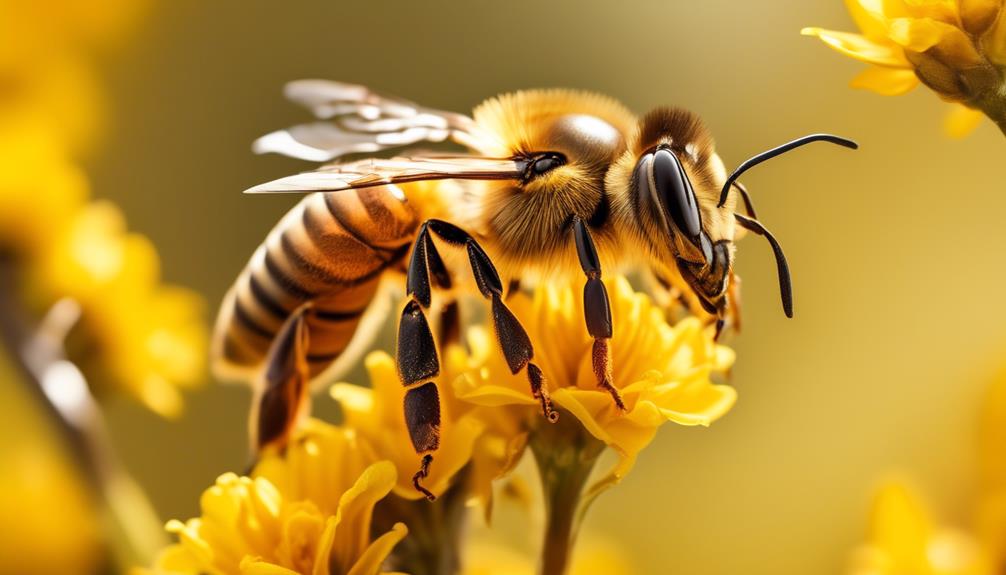
Diving into the world of Asian honey bees, it's essential to note that these insects, originating from Southeast Asia, possess unique behaviors and characteristics that differentiate them from their Western counterparts. Unlike European honeybees, Asian honeybees are smaller and darker with a length of about 10 mm. You'll find that these bees exhibit a higher level of social complexity and are more resistant to certain diseases, thanks to their evolved immune systems.
When considering their behavior, it's noteworthy to mention that these bees exhibit a robust defense strategy against predators like hornets. Instead of stinging their enemies, they've adopted a posture known as 'heat-balling,' where hundreds of bees surround the invader, thereby elevating the temperature and suffocating the intruder.
However, you must understand that Asian honey bees aren't inherently dangerous to humans. They typically attack only when they perceive a threat to their hive. If you maintain a respectful distance, you're unlikely to provoke an attack. In essence, understanding the Asian honey bee requires acknowledging their unique survival strategies and appreciating their essential role in the ecosystem.
Habitats and Behavior
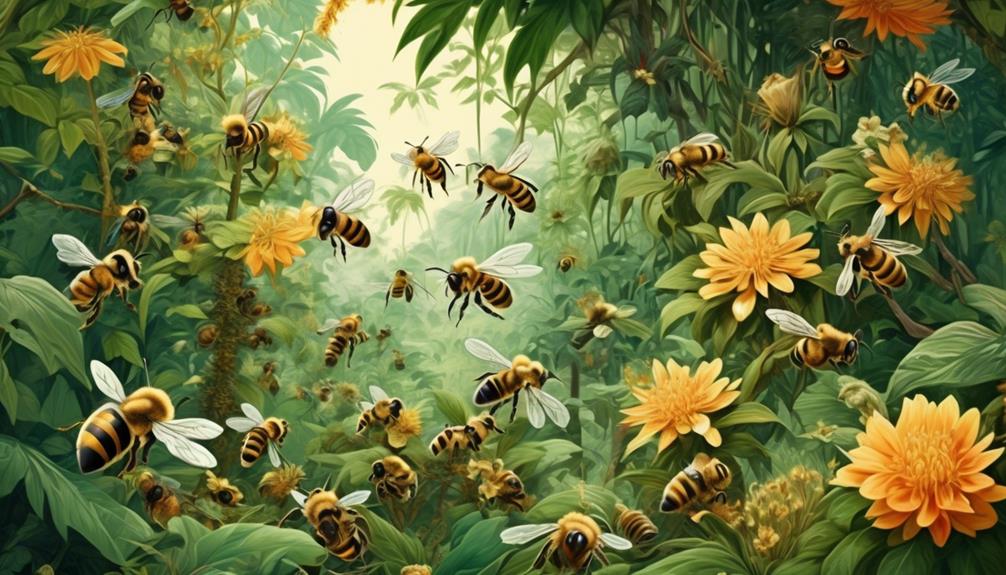
Having explored the unique characteristics and defense mechanisms of Asian honey bees, let's now turn our attention to their habitats and the influence these environments have on their behavior. Asian honey bees, scientifically known as Apis cerana, are native to Southeast Asia but can also be found in parts of the Middle East and Russia. They prefer warmer climates and are known to inhabit diverse habitats.
Now, here's an interesting point to note: the habitats of these bees significantly shape their behavior. To illustrate this, see the table below:
Habitat | Impact on Behavior |
|---|---|
Forested areas | Promotes colony fission, the division of the colony into two or more groups |
Urban areas | Results in aggressive behavior due to higher human interaction |
Agricultural areas | Influences foraging behavior due to abundance of crops |
Mountainous regions | Encourages a dormant period during cold seasons |
In forested areas, they often engage in a behavior called colony fission, dividing their colony into two groups. Urban areas can make them more aggressive due to increased human interaction. In agricultural areas, the abundance of crops influences their foraging behavior. Finally, in the cold season of mountainous regions, they undergo a dormant period. Understanding their habitat and behavior can help us coexist with these fascinating insects.
Potential Dangers to Humans
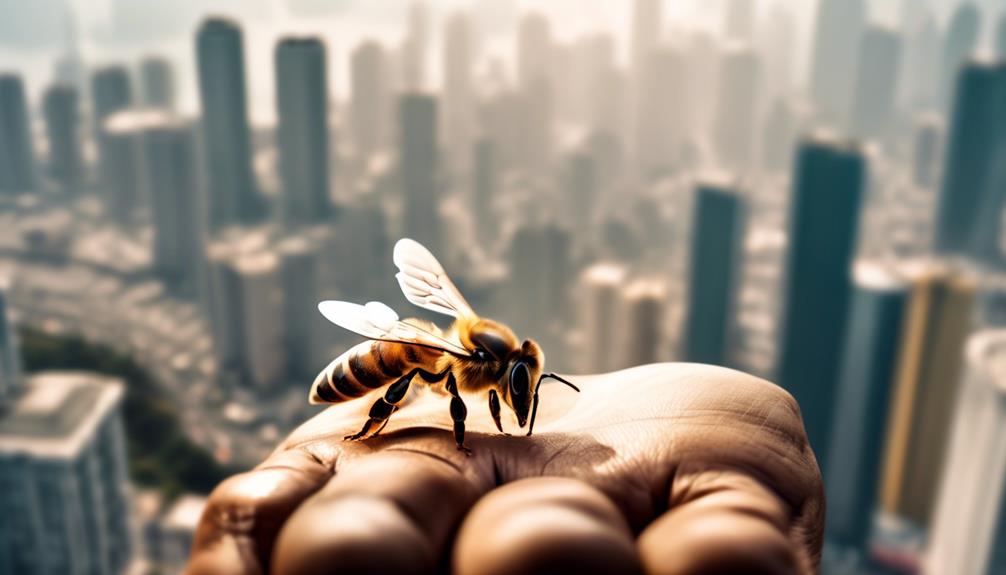
While you might appreciate the ecological role of Asian honey bees, it's important to understand the potential risks they pose to humans, especially in terms of stings and allergic reactions. When an Asian honey bee stings, it releases venom that can cause local discomfort and, in some cases, systemic reactions.
You might experience immediate pain, redness, and swelling at the sting site. However, the severity of these symptoms can vary greatly among individuals, with some experiencing only mild discomfort while others suffer from severe reactions, including anaphylaxis. This is a life-threatening condition characterized by symptoms such as skin rash, nausea, vomiting, rapid pulse, and severe shortness of breath.
Moreover, the venom of Asian honey bees contains pheromones that attract other bees, potentially leading to multiple stings. The accumulation of venom can intensify the allergic reaction. Therefore, it's crucial to remove the stinger as quickly as possible to minimize the amount of venom injected into the body.
All things considered, Asian honey bees aren't inherently dangerous to most people. However, those with bee venom allergies or who encounter a swarm may face significant risks. Thus, caution and awareness are key when dealing with these buzzing creatures.
Mitigating Honey Bee Threats
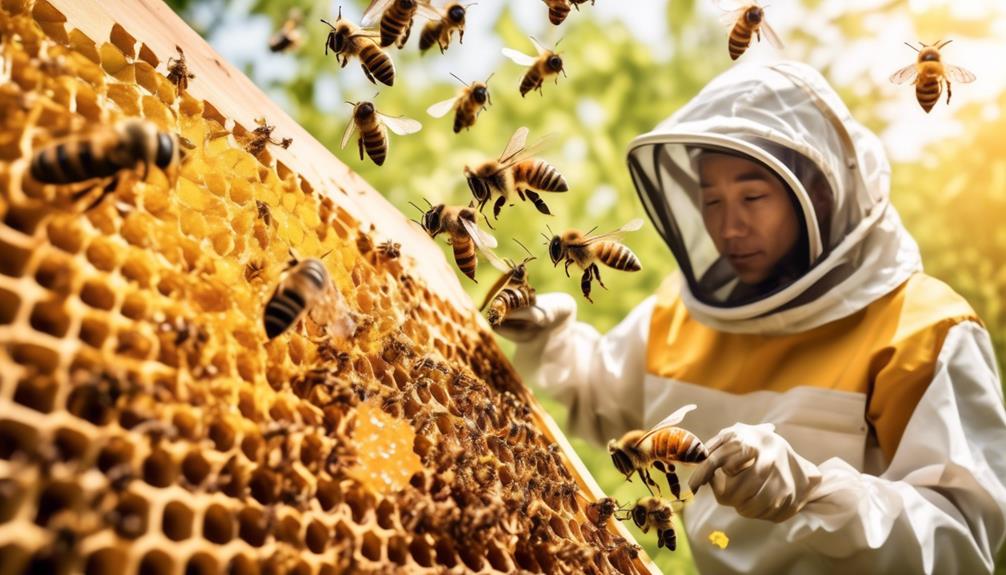
Given the potential risks posed by Asian honey bees, it's essential to explore strategies for mitigating these threats. First and foremost, educating yourself about their behavior, habitats, and distinguishing features is crucial. Asian honey bees aren't typically aggressive unless provoked or their hive is threatened. Therefore, avoiding direct contact and maintaining a safe distance from their hives can significantly reduce the risk of stings.
Practical steps such as wearing protective clothing, using smoke to calm bees, and proper hive management can be effective in reducing threats for beekeepers. You should also consider professional pest control services if a hive is found in your vicinity, as they've the necessary equipment and expertise to remove hives safely.
In terms of ecological strategies, promoting the preservation of native bee populations can help control the spread of Asian honey bees. Native bees are often more effective pollinators and can outcompete Asian honey bees for resources. Therefore, planting native flowers and creating bee-friendly habitats may encourage the proliferation of native bees.
Unpacking Common Misconceptions
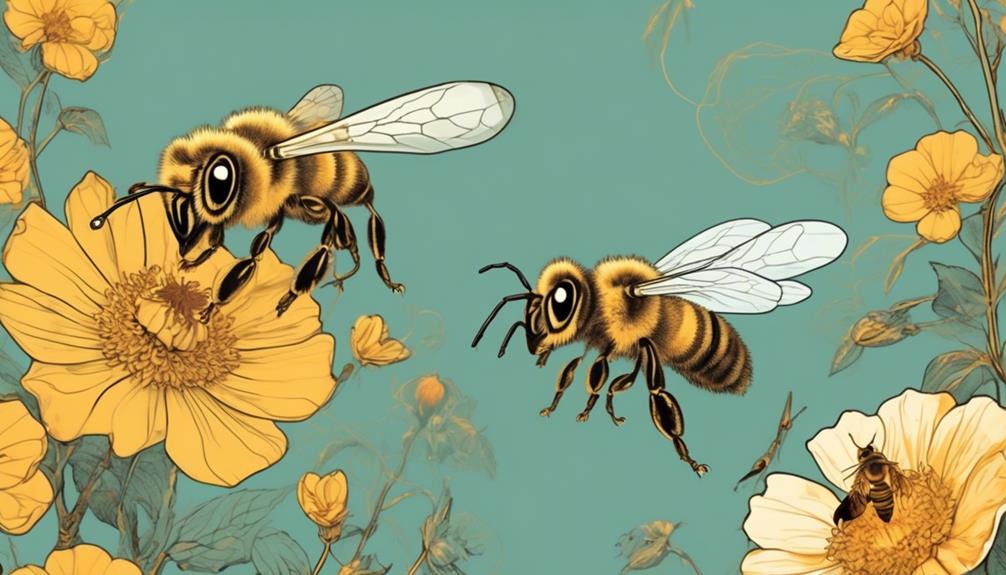
Dispelling myths and misconceptions about Asian honey bees is a crucial step towards understanding their true nature and impact on our ecosystem.
You may often hear that these bees are excessively aggressive and dangerous. However, research shows that, like most bees, Asian honey bees aren't inherently aggressive unless provoked. They generally only attack to defend their hive, and their sting, while painful, isn't typically life-threatening unless you're allergic.
Another misconception is that Asian honey bees are a threat to native pollinators. While they're indeed competitive, studies reveal that these bees can coexist with native species and even aid in enhancing biodiversity. They're versatile pollinators, capable of adapting to various environments and contributing to the pollination of a wide range of plants.
Lastly, you may think that the introduction of Asian honey bees can lead to the collapse of local honey production. It's essential to note that they're efficient honey producers themselves and can potentially boost local honey markets.
Conclusion
In conclusion, Asian honey bees aren't inherently dangerous. They're just defending their habitats when provoked. However, their stings can cause serious reactions in some people. It's important to respect their space and take measures to avoid disturbing them.
Remember, not all the buzz about these bees is true – they're crucial pollinators that play a vital role in our ecosystems. So, let's co-exist wisely and dispel the misconceptions about these industrious insects.

